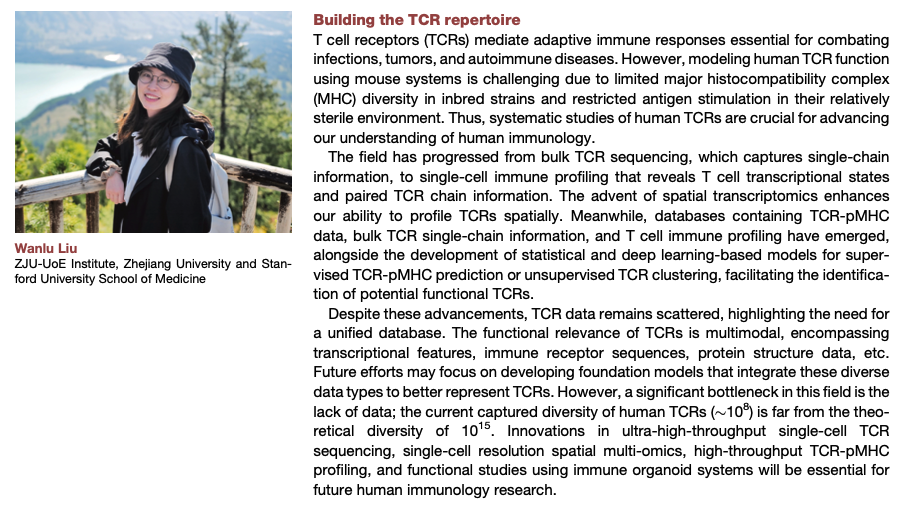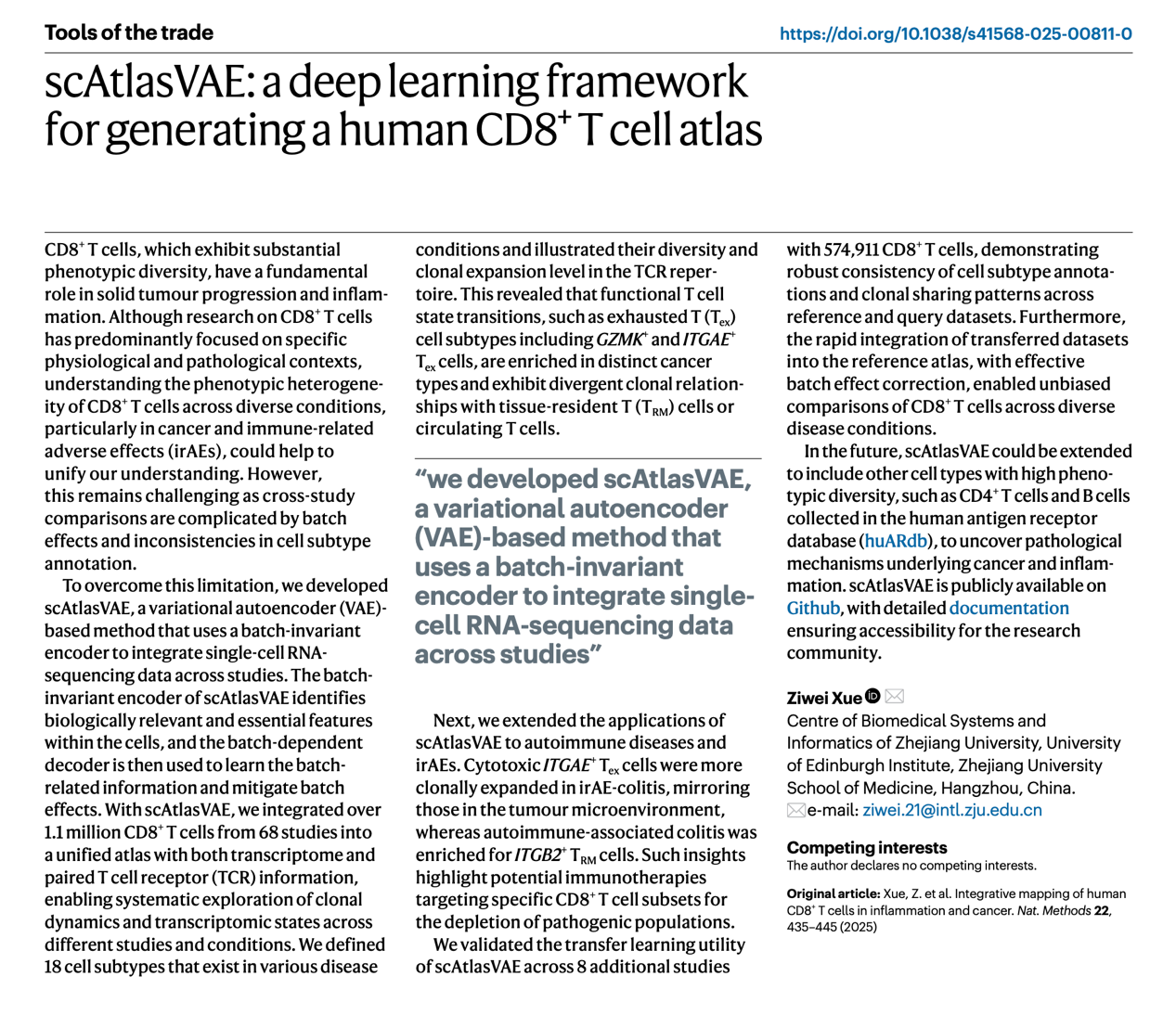The advancement of clinical and therapeutic innovations is fundamentally dependent on a deepened understanding of the human immune system. In the Voices article recently published in Immunity, leading experts in the field deliberated on emerging approaches in human immunology research. The discourse underscored the essential role of stringent experimental design and standardized specimen acquisition in driving the frontiers of immunological science.


Researcher Wanlu Liu from the Zhejiang University-University of Edinburgh Institute (ZJE) was invited to contribute a Voices article to Immunity, entitled "Building the TCR Repertoire". The article provides a systematic exposition of recent advances and emerging challenges in T cell receptor (TCR) research within human immunology, offering innovative perspectives and insights that further the development of the field.
Researcher Wanlu Liu emphasized: "The T cell receptor (TCR) serves as the cornerstone of adaptive immunity, with its diversity directly dictating the organism's capacity to combat disease." She highlighted that due to inherent limitations in MHC diversity and antigen-specific environments in mouse models, direct and systematic investigation of human TCRs holds irreplaceable scientific value. From early bulk sequencing techniques to single-cell immune profiling—capable of simultaneously resolving T cell transcriptional states and paired TCR chain information and further to the newly emerging spatial transcriptomics technologies, the methodological landscape has evolved substantially. Liu pointed out that, alongside the rapid development of diverse TCR databases and AI-based predictive models, the field has now entered a new era of data-driven research.
In light of the three major challenges currently facing the field—data scatter, multimodality, and insufficient data scale—Wanlu Liu has proposed a set of transformative solutions. She advocates for the establishment of a unified TCR database, the development of foundational models capable of integrating multimodal information, and the expansion of data generation through ultra-high-throughput single-cell sequencing technologies. These insights provide a clear and actionable technological roadmap for the advancement of the field.
Article link:
Approaches toward understanding human immunity - ScienceDirect
ZJE Ph.D. student Ziwei Xue from Wanlu Liu Lab Invited to Contribute a Tools of the trade Article to Nature Reviews Cancer: scAtlasVAE: a deep learning framework for generating a human CD8+ T cell atlas

Wanlu Liu’s research group believes that the growing volume of immunomics (omics for immunology) data would benefit our understanding of the human immune system. The most important part of the immunomics data is the single-cell RNA-sequencing data (scRNA-seq) which has profiled human T cells across various organs and disease conditions, yet significant challenges remain in integrating these datasets to obtain a comprehensive view of T cell heterogeneity and functional states. Current efforts are often limited by batch effects, inconsistent cell annotations, and differences in experimental protocols and sequencing platforms, making cross-study comparisons difficult.
To address these issues, Wanlu Liu’s research group is working on deep learning based computational method that unify diverse scRNA-seq datasets into a standardized reference atlas. Such approaches not only enhance our capacity to identify conserved and context-specific T cell subsets, but also provide deeper insights into their roles in disease pathogenesis and therapeutic outcomes. Using scAtlasVAE, Ziwei Xue and his collegues have integrated datasets from the human antigen receptor database (huARdb) and generated a CD8+ T cell reference atlas. Leveraging the reference datasets, the research group have discovered signatures of CD8+ T cells in cancers and immune-related adverse effects (irAEs).
In the future, the research groups is aiming to extend the huARdb database and develop more scalable computational framework for the T cell computational immunology. They envision that such integrative frameworks will serve as a valuable community resource, guiding T cell biomarker discovery, and informing the rational design of next-generation immunotherapies.
Article link
Tools of the Trade – Nature Reviews Cancer
Research Laboratory Introduction
About lab
Dr. Wanlu Liu’s research team specializes in the development of single-cell spatial multi-omics technologies and deep learning algorithms, with a dedicated focus on bioinformatics and computational immunology of T cells. The team has published 50 articles as corresponding author (including co-corresponding authorships) in leading international journals including Cell, Nature Methods, Nature Communications, and Nucleic Acids Research. They have filed four national invention patents, one of which has been granted. The group leads research projects supported by the National Natural Science Foundation of China General Program and the Tencent AI Lab Rhino-Bird Special Research Program.

Dr. Liu has been recognized as a National-level Young Talent and a Zhejiang Provincial Young Talent. She also holds several academic appointments, including Member of the Immunocyte Biology Branch of the Chinese Society for Cell Biology, Member of the Molecular Immunology Committee of the Chinese Society of Biochemistry and Molecular Biology, Council Member of the Zhejiang Society of Bioinformatics, Member of its Youth Committee, and Honorary Lecturer at the University of Edinburgh, UK.
Email:wanluliu@intl.zju.edu.cn;
Laboratory Website:https://labw.org







